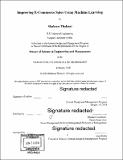| dc.contributor.advisor | Michael Cusumano. | en_US |
| dc.contributor.author | Thobani, Shaheen | en_US |
| dc.contributor.other | Massachusetts Institute of Technology. Integrated Design and Management Program. | en_US |
| dc.date.accessioned | 2018-10-15T20:23:10Z | |
| dc.date.available | 2018-10-15T20:23:10Z | |
| dc.date.copyright | 2018 | en_US |
| dc.date.issued | 2018 | en_US |
| dc.identifier.uri | http://hdl.handle.net/1721.1/118511 | |
| dc.description | Thesis: S.M. in Engineering and Management, Massachusetts Institute of Technology, System Design and Management Program, 2018. | en_US |
| dc.description | Cataloged from PDF version of thesis. | en_US |
| dc.description | Includes bibliographical references (pages 68-70). | en_US |
| dc.description.abstract | Trends show promising growth of the online e-Commerce industry. While the e-Commerce companies are aggressively moving towards digital sales and marketing, the customers are being bombarded with frequent and often irrelevant marketing communication from myriad sources. The thesis proposes understanding the digital purchase journeys of the customers from the lenses of both sellers and customers to make online sales and marketing efforts relevant and intelligent. The thesis applies the improved customer journey framework to identify the needs of the customers and goals of the seller at various stages of customer purchase journey. It discusses the need to take an integrated view of the purchase journey to improve the customer experience at the journey level. It illustrates with an example how to design end-to-end journeys - a starting point for consciously shaping the purchase journeys. Larger companies are using Machine Learning to improve marketing technologies and processes to create a competitive advantage and capture market share through digital presence. The thesis aims to understand and illustrate the applications of Machine Learning to digital sales and marketing ecosystem for the e- Commerce industry. It first understands the e-Commerce touchpoints using which customers interact with the brands and delves deeper into the underlying technologies powering these touchpoints. Then it illustrates and analyzes the application of Machine Learning to the e-Commerce website which includes search, recommendation system, and Product Detail Page with an aim to improve conversion, and to the advertising ecosystem which includes Data Management Platform and Demand Side Platform in order to enable prospecting and customer targeting. The thesis also illustrates and proposes the use of a framework called 'Machine Learning Canvas' to systematically apply Machine Learning to any system while keeping value proposition for the business in the center. | en_US |
| dc.description.statementofresponsibility | by Shaheen Thobani. | en_US |
| dc.format.extent | 70 pages | en_US |
| dc.language.iso | eng | en_US |
| dc.publisher | Massachusetts Institute of Technology | en_US |
| dc.rights | MIT theses are protected by copyright. They may be viewed, downloaded, or printed from this source but further reproduction or distribution in any format is prohibited without written permission. | en_US |
| dc.rights.uri | http://dspace.mit.edu/handle/1721.1/7582 | en_US |
| dc.subject | Engineering and Management Program. | en_US |
| dc.subject | Integrated Design and Management Program. | en_US |
| dc.title | Improving e-Commerce sales using machine learning | en_US |
| dc.title.alternative | Improving electronic-commerce sales using machine learning | en_US |
| dc.type | Thesis | en_US |
| dc.description.degree | S.M. in Engineering and Management | en_US |
| dc.contributor.department | Massachusetts Institute of Technology. Engineering and Management Program | en_US |
| dc.contributor.department | Massachusetts Institute of Technology. Integrated Design and Management Program. | en_US |
| dc.identifier.oclc | 1054731194 | en_US |
